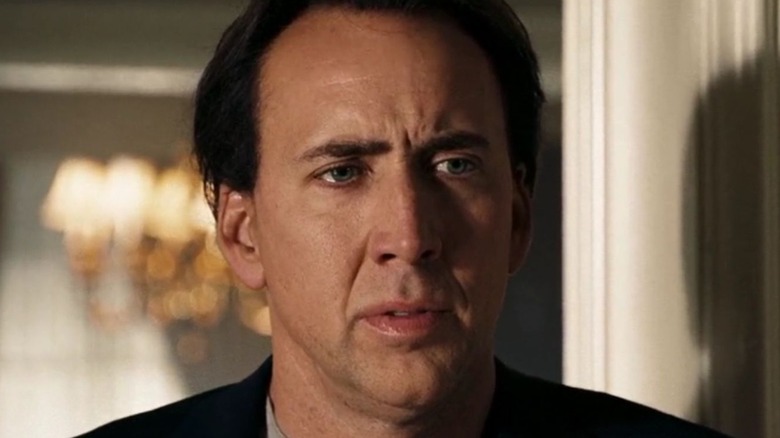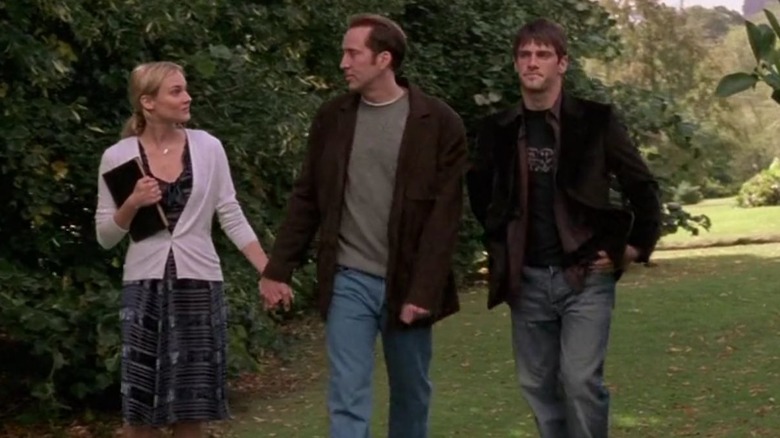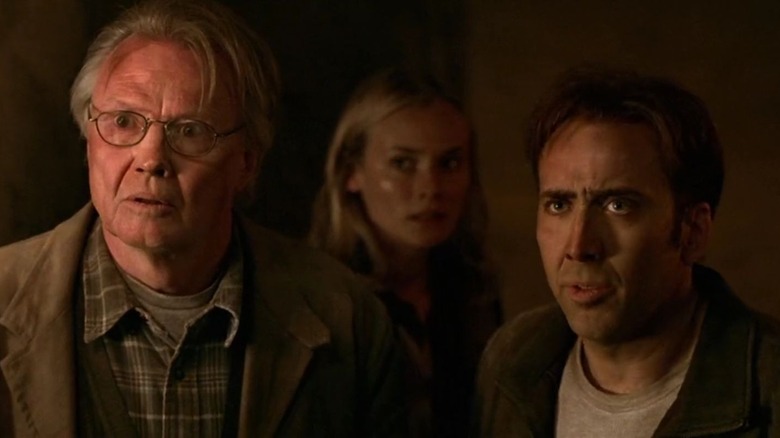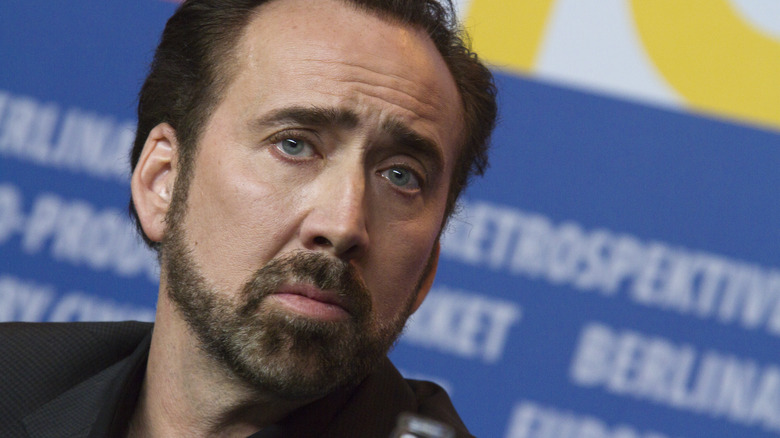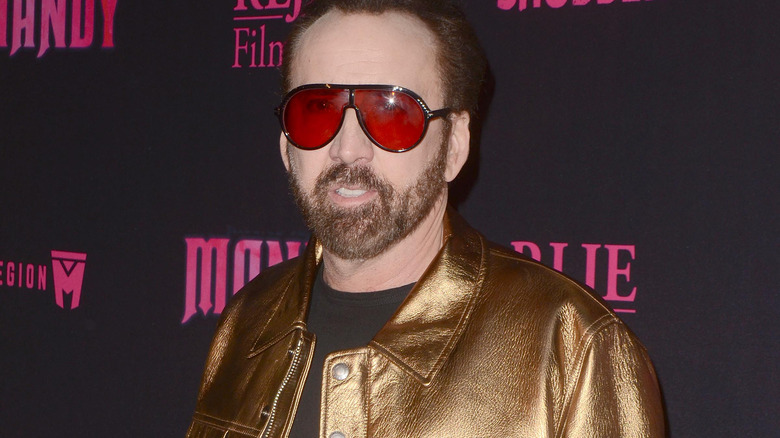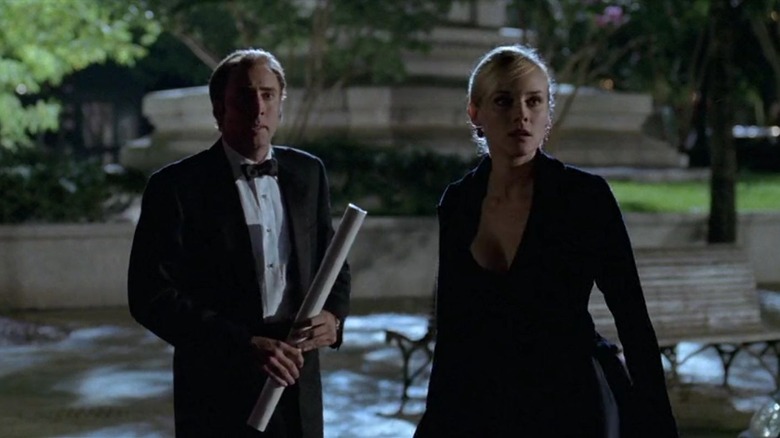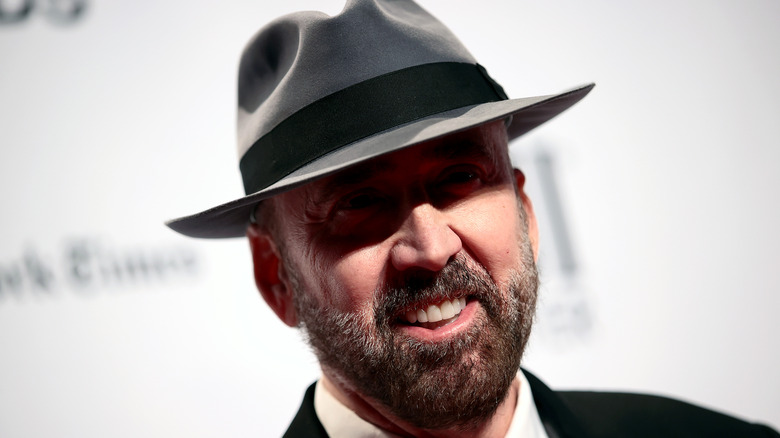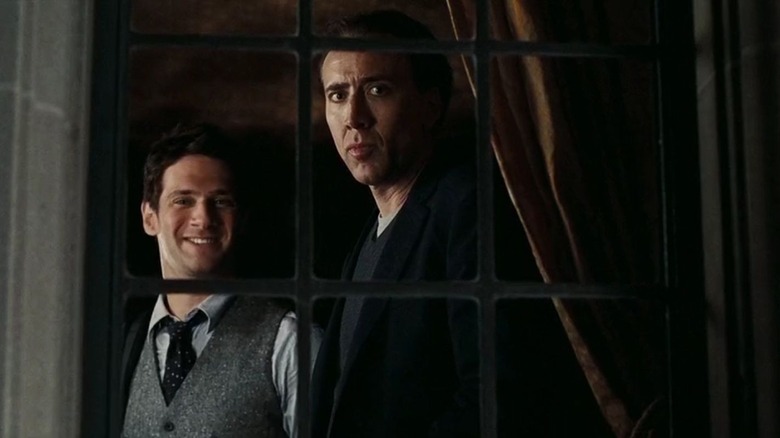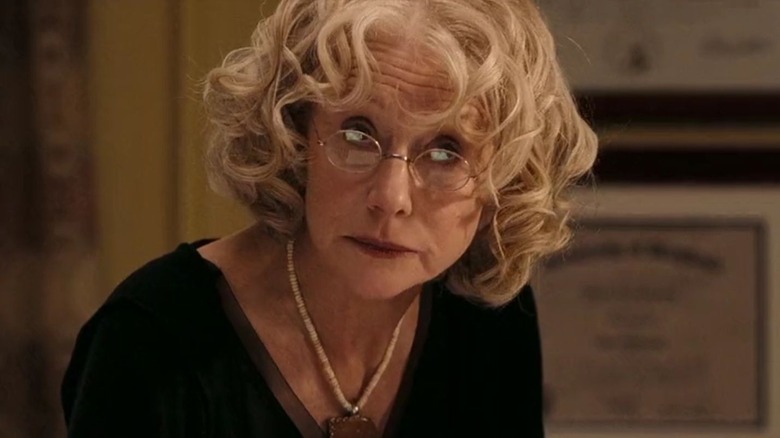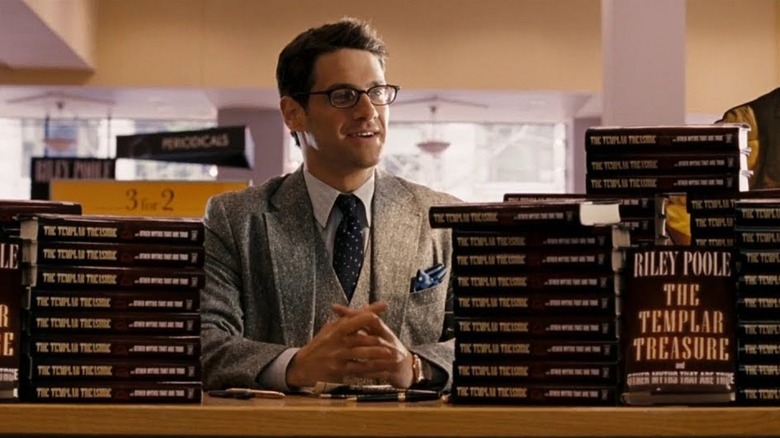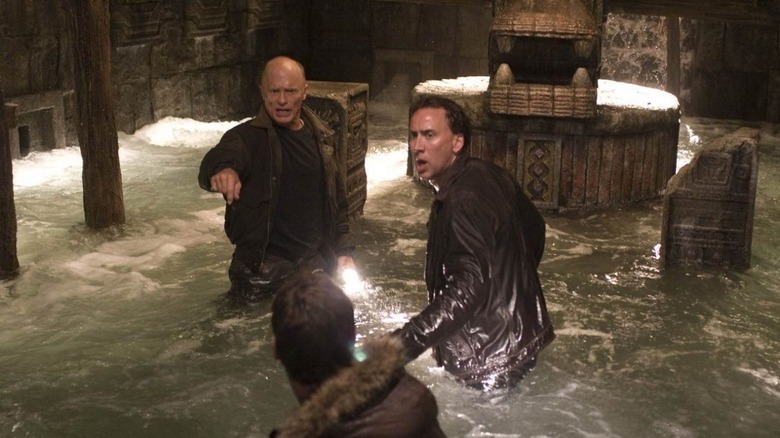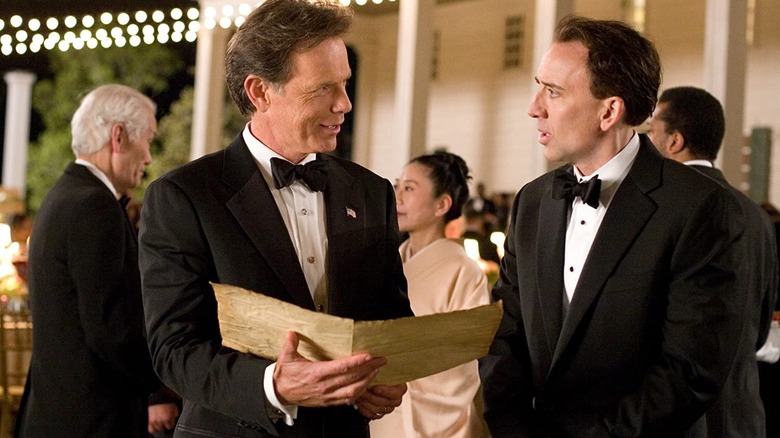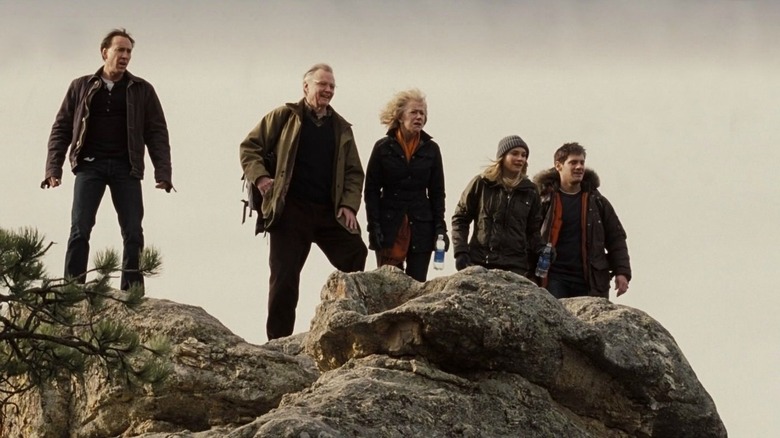The Untold Truth Of The National Treasure Franchise
If you're looking for a fun globe-trotting adventure, either of the original "National Treasure" movies will do in a pinch. Nobody will declare them to be auteur masterpieces, but both titles succeed nicely in their ambitions and make for a great showcase for increasingly absurd storylines involving historical landmarks from across America. Even better, they're both headlined by Nicolas Cage, who's in his element lending his own brand of madness to the part of a determined treasure hunter. If you want to see Cage lend unparalleled levels of sincerity to a character declaring he's going to steal the Declaration of Independence, you can't look anywhere else than the "National Treasure" series.
Even if you're a die-hard fan of the "National Treasure" franchise, though, there are aspects of this series that will likely have escaped your gaze. Fittingly, for a franchise all about buried treasure hiding in plain sight, the "National Treasure" series is chock full of behind-the-scenes secrets. These include alternate release dates for the inaugural entry in the series, Nicolas Cage's experiences making these movies, and even how the director of the franchise feels about constant comparisons to "The Da Vinci Code." No need to go tracking down clues across America for the untold truth of the "National Treasure" saga, you can just read on and discover everything you wanted to know about this franchise.
The original release date and plans for National Treasure
The saga of "National Treasure" dates back to the late 1990s. In February 1999, Variety broke the news that Disney had green-lit a new project named "National Treasure" that Jon Turteltaub would direct. The goal at this juncture was to get the movie out in time for Independence Day 2000 while Disney was already working with its go-to marketing partners, like McDonald's, to ensure that lucrative promotional tie-ins could be created for "National Treasure."
This news also revealed that Oren Aviv and Charles Segars were the ones that came up with the idea for the film. Neither producer Jerry Bruckheimer nor any actors, let alone the eventual final cast of "National Treasure," were attached to the project at that moment. "National Treasure" was already seen as a high-priority investment for Disney, especially since the studio was giving it the 4th of July spot that certain then-recent Disney blockbusters, such as "Armageddon," had occupied. However, despite the initial enthusiasm and hopes of getting it out in time for 2000, it would take a little while longer for the movie to reach the big screen. As the hidden loot of the "National Treasure" films can attest, though, some things are very much worth waiting for.
The indecision over National Treasure being a Disney film
Today, the definition of a Disney film has expanded to include PG-13 titles occupying the "Star Wars" and Marvel Cinematic Universe franchises. Even certain live-action remakes of classic Disney cartoons, such as "Mulan," have sported this rating, per The Hollywood Reporter. However, in the early 2000s, titles that didn't tidily fit under the Walt Disney Pictures banner were squarely shoveled away to the Touchstone Pictures or Hollywood Pictures division. This practice impacted "National Treasure," which was initially announced by Variety as a Disney title but by 2001 had been shifted over to the Touchstone Pictures label.
However, once moviegoers were able to see "National Treasure" in theaters in 2004, it was impossible to miss that the movie began with the Walt Disney Pictures logo. What happened here? In a 2005 review of "National Treasure," Kevin Cedeno of DVDizzy speculated that the title scoring a PG-rating from the MPAA, as well as the success of the PG-13 "Pirates of the Caribbean," under the Disney name inspired the Mouse House to take a risk and allow "National Treasure" to come back under the Disney umbrella. This move paid off handsomely and "National Treasure" served as a harbinger of Disney more regularly engaging in titles that may not look immediately like classic Disney fare.
What lured Nicolas Cage to doing National Treasure
Even before he did multiple "National Treasure" movies, Nicolas Cage was no stranger to mainstream-friendly projects. While he had done his fair share of arthouse fare, Cage was also a veteran of big action blockbusters released by Disney's adult-skewing divisions, such as "The Rock" and "Con Air." "National Treasure" was less of a departure for Cage and more of an evolution, since this go-around he'd be working within the confines of a PG MPAA rating. Though not a massive difference from his earlier works, one still has to wonder what drew Cage to doing "National Treasure" in the first place.
Talking to Black Film, Cage revealed that his interest in "National Treasure" largely came from the concept of a man vowing to steal the Declaration of Independence. With this absurd idea lodged into his brain, Cage became fascinated with how a genuine movie like "National Treasure" would pull this plot point off. Plus, Cage's prior experiences with "National Treasure" producer Jerry Bruckheimer meant that this leading man was confident that this globe-trotting adventure movie would be brought to life with top-notch talent. Throw in the appeal of getting to wear a tux and "National Treasure" became an easy yes for Nicolas Cage.
Nicolas Cage's experiences with his co-stars
For "National Treasure," Nicolas Cage wouldn't just be sharing the screen with the Declaration of Independence. He would also have two prominent co-stars, Diane Kruger and Justin Bartha. The former would be playing Abigail Chase, an eventual love interest for Cage's Ben Gates, while Bartha would be playing tech-savvy comic relief, Riley Poole. Per Cage himself, an enjoyable camaraderie emerged between the trio that helped to make filming "National Treasure" a pleasure rather than a chore.
Talking to Black Film, Cage revealed that what united all three of these actors was their unorthodox sense of humor. Referring to his co-stars as "very mischievous," he also noted that they bonded over multiple karaoke sessions. "I think it was some Rage Against the Machine, AC/DC and some Sex Pistols," Cage remarked over what tunes the group belted out before commenting that such seemingly frivolous excursions ended up being perfect bonding experiences for the main trio of "National Treasure."
Cage also praised how Kruger and Bartha were good at coming up with new ideas or willing to try out fresh concepts while acting in front of the camera. This proved useful in cracking the unique tone of "National Treasure" while the willingness to explore fresh concepts lent a spontaneity to the set that Cage thrives on. It certainly sounds like "National Treasure" provided Cage with extremely affable co-stars on the set and, most importantly, top-tier karaoke cohorts!
The surprise box office success of National Treasure
It's not like people expected "National Treasure" to bomb when it hit movie theaters in November 2004, but it did look like a David to a lot of other family movie Goliaths in the marketplace that month. Disney had "The Incredibles" dropping just two weeks earlier, "The Polar Express" had debuted a week before, and "National Treasure" would be opening directly against "The SpongeBob SquarePants Movie." Considering that all of these movies featured either beloved source material or the Pixar brand name, it did look like "National Treasure" would have an uphill climb to financial profitability.
However, "National Treasure" proceeded to shatter all expectations upon its opening weekend, where it took in $35.1 million, enough to top the North American box office and even surpass the bow of "SpongeBob." As it turned out, "National Treasure" had more immediate appeal to teenagers and adults than competing family movies, with families only making up 24% of its opening weekend audience. This allowed it to not get immediately crushed by competing PG-rated projects like "The Incredibles." As a cherry on top, this debut was also the biggest ever for Nicolas Cage at the time. Rather than fade away from the box office after an impressive opening weekend, "National Treasure" went on to exceed $170 million domestically and $331 million worldwide. All in all, not too shabby for something that initially looked like it'd get crushed in the November 2004 rush.
Why Nicolas Cage broke his no sequel policy for National Treasure 2
Nicolas Cage has done a lot in his varied career. He's been stung by bees, won an Academy Award, made people cry over his yearning over a pig, just to name a few of his accomplishments. But one thing he hadn't done, up until the mid-2000s, was a sequel. However, Cage broke this precedent for "National Treasure: Book of Secrets." The follow-up to "National Treasure," this project saw Cage reprising the role of treasure hunter Ben Gates. Given the scarcity of sequels in his career up to this point, it bears asking what drew Cage in to do more "National Treasure."
Talking to Collider, Cage reaffirmed that his usual aversion to sequels was because he doesn't like to repeat himself as a performer. However, when he got offered "Book of Secrets," several factors convinced him to embrace a sequel. For one thing, he loved the idea of this film going bigger and more absurd than its predecessor, especially with the prospect of kidnapping the President of the United States. For another, Cage saw Gates as a modern-day equivalent to someone like Sherlock Holmes, a character who naturally goes on multiple adventures. Finally, Cage also loved the idea that the "National Treasure" films could convince younger viewers to engage with and learn about real history. With all these elements in play, Cage found it a no-brainer to break his no sequel streak for "Book of Secrets."
The most challenging National Treasure 2 scene for Cage to film
Given his commitment to doing anything and everything in movies, no matter how weird, you might suspect that Nicolas Cage is an actor who brushes off any on-set difficulties. However, though he may seem like anything but on the big screen, Nicolas Cage is only human. He's just as prone to feeling overwhelmed or daunted by what he has to accomplish in a blockbuster. This is just as true of "National Treasure: Book of Secrets" as any other movie, with one particular big sequence in this project providing an extreme amount of stress for the Oscar-winning performer.
"Well, the most challenging sequence hands down was the platform, the balancing platform sequence because it was a mathematical, physical conundrum to act," Cage noted to Collider, referring to a big set piece in the third act of "Book of Secrets. "I had to try to keep in my head what happens in terms of leverage and physics if you step here and he goes up there or she goes down there. It just was a mess. It actually had to be reshot once or twice to get it to make sense for all of us." Though not an easy scene to film, Cage being so committed to even these sort of overwhelming sequences is a testament to his conviction as a performer.
How did Helen Mirren and Ed Harris get roped into National Treasure 2?
For the second installment in the "National Treasure" saga, it wasn't just the locations and stakes that got bigger. The cast also got a significant dose of star power with Helen Mirren and Ed Harris playing new characters. The former played the mother of Ben Gates, while the latter portrayed the villain of the movie. Given how ridiculous these "National Treasure" movies can be, it may seem puzzling to imagine awards darling performers like Mirren and Harris to be game for this material. However, they turned out to be very much on board with this globe-trotting tomfoolery.
In an interview with DVDizzy, director Jon Turteltaub noted that the most important thing that secured the participation of Mirren and Harris was that they enjoyed the screenplay for "National Treasure: Book of Secrets" and the roles they would be playing in it. He also noted that the past successes of himself and producer Jerry Bruckheimer (the latter of whom had worked with Harris on past projects like "The Rock") provided further security and comfort. Additionally, the excitement over working with "National Treasure" mainstays like Nicolas Cage also attracted big names, though even Turteltaub didn't deny that hefty paychecks also played a part in getting Mirren and Harris to agree to read the "Book of Secrets."
Director Jon Turteltaub's frustration with Da Vinci Code comparisons
Back in the mid-2000s, treasure hunting movies suddenly became very popular again. The extreme success of the "Da Vinci Code" book in 2003 helped spur a trend that encompassed multiple film adaptations of books from "The Da Vinci Code" series as well as a pair of "National Treasure" movies. Even Indiana Jones came back to movie theaters at the end of this craze with "Indiana Jones and the Kingdom of the Crystal Skull." Though "National Treasure" was a key part of this trend, pivotal creative individuals in this series would rather you not just refer to it as a "The Da Vinci Code" knock-off.
Talking to DVDizzy, director Jon Turteltaub recalled the constant comparisons of "National Treasure" to "The Da Vinci Code" and even perceptions that his Disney film ripped off the popular Dan Brown novel, "the greatest single source of frustration for me" in regards to this blockbuster. He was especially indignant because "National Treasure" was that rare beast in mainstream Hollywood, a totally original idea with no pre-existing source material. To have that widely be seen as just riding the coattails of Robert Langdon's adventure frustrated Turteltaub, especially since he remembered being dubious that "The Da Vinci Code" could even as a film. Common misconceptions over "National Treasure" being a "Da Vinci Code" knock-off also played into his perception that the general public incorrectly assumes filmmakers are always looking to steal someone else's ideas.
The earliest murmurs of National Treasure 3
Disney doesn't like to waste time when it comes to sequels. Given that "National Treasure: Book of Secrets" was a gigantic box office hit when it opened in December 2007, it was a foregone conclusion that Disney would be interested in further expanding on the world of Ben Gates and company. It wouldn't be long before those ambitions were made apparent. By February 2008, /Film reported that Disney had registered website domains for not just "National Treasure 3," but also for a prospective "National Treasure 4." This treasure hunting series was about to become a full-blown saga, which was fitting since Disney was looking to blow fellow Jerry Bruckheimer franchise "Pirates of the Caribbean" into a series that could stretch beyond a trilogy at the same point, as reported by the Los Angeles Times.
A few months after those fateful URLs were claimed, director Jon Turteltaub spoke to DVDizzy in 2008 about the prospect of "National Treasure 3." After confirming his interest in helming in such a project, he said that this potential production would be roughly three years away. This would be due to his commitments to directing "The Sorcerer's Apprentice" for Disney as well as desires from everyone involved to get the script just right. These earliest comments make it clear that Disney has always had an interest in doing something else with the "National Treasure" franchise after "Book of Secrets." However, constant problems would keep this sequel from becoming a reality.
That time National Treasure 3 crashed a Disney shareholders meeting
Shareholder meetings for big corporations like Disney are usually a time for CEOs to drop big announcements about upcoming projects and for financial minutiae to get hashed out through questions from shareholders. Typically, these queries can be important, but they can also be a little dense and aren't generally what you'd call riveting entertainment. A notable exception to this norm came about in 2017 when a Q&A session during a shareholder's meeting where ComicBook reports that one person asked former Disney CEO Bob Iger the most important question of all: what was going on with "National Treasure 3?"
It was a sharp contrast to all the other questions lobbed at Iger that day and indeed the typical shareholder questions at any meeting of this nature. However, given that it had been ten years since "National Treasure: Book of Secrets" at this point, it's understandable why there'd be a pressing urgency behind this project's existence that would creep into even a shareholders meeting. Iger responded to the question in good humor, noting that there was a passion for getting the sequel off the ground but that no script or green-lit had been delivered for the blockbuster. Even with this memorable display of passion for the franchise, it was clear "National Treasure 3" was still a ways off.
What is holding up National Treasure 3?
Despite the modern incarnation of Disney making sequels to everything from "The Avengers" to "Home Alone," "National Treasure 3" has remained a constantly delayed project, one that occasionally seems close to finally becoming a reality only for it to get snatched out of the hands of fans of this franchise. Given how the first two were such moneymakers, not to mention that it's been long enough for genuine nostalgia to develop over the initial "National Treasure" installments, it begs the question of what exactly is keeping moviegoers from enjoying new adventures with Ben Gates?
In May 2016, Nicolas Cage summed up to Entertainment Weekly the primary issue that appears to be keeping "National Treasure 3" is the screenplay. Cage noted that the "National Treasure" movies require a lot of moving parts to function properly, and getting them right on a story level takes a lot of time and precision. At the time, it seemed like the actor was still game for a "National Treasure 3" despite the constant issues with getting a solid script ready. However, Cage added a new critical reason for the continuing postponement of "National Treasure 3" in 2021 by noting to Variety that, in his current stage as an actor, he might not have any interest in doing a big Disney blockbuster like this sequel. Whatever the reason, plenty of factors have kept a highly-demanded project like "National Treasure 3" from becoming a reality.
